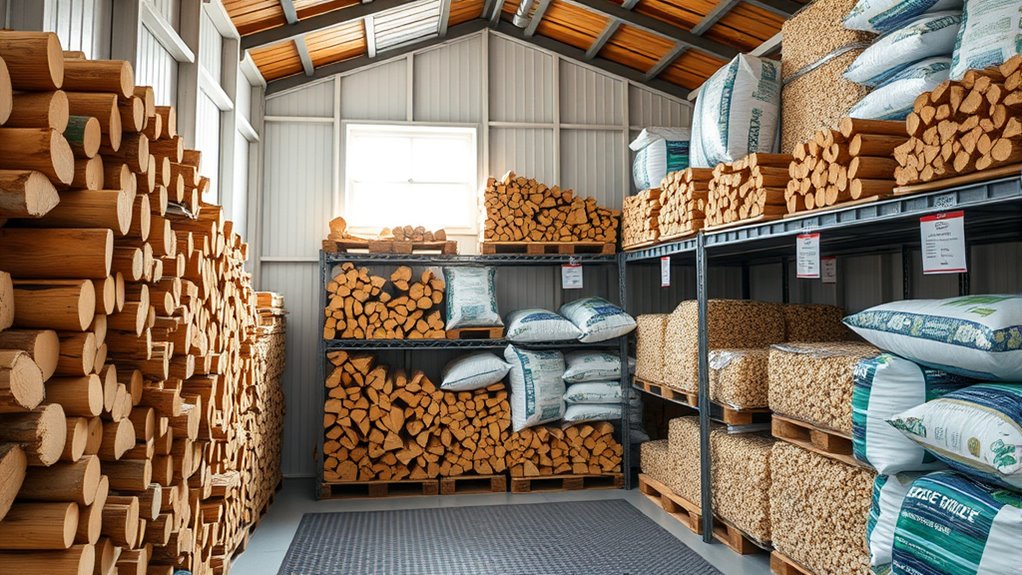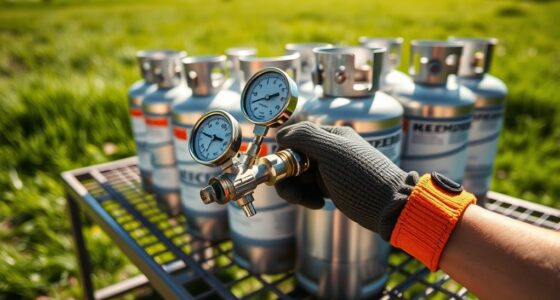To store wood or pellets safely, choose a dry, well-ventilated area away from heat sources, open flames, and direct sunlight. Keep the storage space cool and elevate the fuel off the ground to prevent moisture buildup. Use sturdy containers or racks designed for fuel storage and regularly inspect for signs of pests or mold. Proper storage reduces fire risk and maintains the quality of your fuel, and more tips await if you keep exploring.
Key Takeaways
- Store wood or pellets in a dry, well-ventilated area away from heat sources and open flames.
- Use dedicated, fire-resistant containers or storage units designed for combustible materials.
- Keep stacks stable and off the ground to prevent moisture absorption and pest intrusion.
- Avoid storing near vents, windows, or high traffic areas to reduce fire risk and ensure good airflow.
- Regularly inspect storage areas for signs of pests, mold, or damage, and maintain proper organization.

Have you ever wondered how to store fuel safely and prevent accidents? Proper storage of wood or pellets isn’t just about keeping your supplies organized; it’s about protecting yourself, your home, and those around you from potential dangers. One of the main concerns is flammable hazards, which can lead to fires if not handled correctly. To minimize these risks, you need to understand the importance of proper container use. Using the right containers ensures that your fuel remains stable and less likely to cause accidents. Always choose containers specifically designed for storing combustible materials. These containers are built to withstand pressure and prevent leaks, reducing the chance of accidental ignition. Avoid using makeshift containers like old cans or unapproved plastic bottles, as these can deteriorate or leak over time, increasing the risk of fire or spill hazards.
When selecting containers, look for those made from durable, fire-resistant materials, and ensure they seal tightly to prevent vapors from escaping. Vapors from wood fuel or pellets are highly flammable, and even a small spark can ignite them. Proper container use involves filling them carefully without over-tightening caps, which can cause pressure buildup. Store containers upright on stable surfaces, away from heat sources, open flames, or electrical equipment, since sparks could ignite the vapors. Keep in mind that flammable hazards aren’t limited to just the fuel itself; the container’s surroundings matter a lot. Avoid storing fuel near vents, windows, or areas with high foot traffic to prevent accidental knocking over or exposure to heat.
Another critical aspect is keeping your storage area well-ventilated. Good airflow helps disperse any vapors that might escape, reducing the likelihood of dangerous buildup. Make sure your storage space is cool, dry, and away from direct sunlight, which can increase vapor pressure and cause containers to degrade faster. It’s also smart to keep a fire extinguisher nearby, specifically rated for flammable liquids, and ensure you know how to use it. Regularly inspect your containers for signs of damage, such as cracks or leaks, and replace them immediately if you notice issues. Additionally, consider using specialized storage solutions to enhance safety and containment measures. Remember, the key to safe fuel storage is respecting the flammable hazards involved and adhering to proper container use. By doing so, you considerably reduce the risk of accidental fires and ensure your fuel remains safe and secure until you’re ready to use it.
Frequently Asked Questions
Can I Store Wood or Pellets Outdoors Safely?
Yes, you can store wood or pellets outdoors safely if you take precautions. Keep the storage area protected from rain and moisture to prevent mold and maintain proper indoor humidity levels. Use a covered, well-ventilated shed or container. Always prioritize fire safety by keeping the storage away from flames or heat sources, and ensure the wood or pellets stay dry to avoid safety hazards and maintain their quality.
How Do I Prevent Pests From Contaminating Stored Fuel?
Prevent pests from contaminating your stored fuel like a fortress guards its treasure. You should practice pest prevention by sealing your storage containers tightly and keeping the area clean. Regular storage sanitation is key—remove any debris or old wood that attracts insects. Elevate your wood or pellets off the ground, and consider using natural repellents. These steps create a hostile environment for pests and make certain your fuel stays fresh and safe.
What Are the Best Ventilation Practices for Storage Areas?
To guarantee proper ventilation in your storage area, focus on airflow optimization by designing the space with adequate vents or windows that promote cross-ventilation. Keep vents unobstructed and consider installing exhaust fans if needed. Proper storage area design minimizes moisture buildup and prevents mold, pests, and fuel deterioration. Regularly inspect ventilation systems to maintain consistent airflow, which helps keep your wood or pellets dry, safe, and ready for use.
Is It Safe to Store Fuel Near Electrical Outlets?
Storing fuel near electrical outlets is a dangerous recipe for disaster. It’s like playing with fire in a lightning storm! For electrical safety, you should never place fuel containers within a safe distance of outlet placement. Keep wood or pellets far away from outlets, switches, and electrical cords to prevent sparks or accidental ignitions. Your home’s safety depends on avoiding these risky setups—think of outlets as no-fly zones for fuel!
How Often Should I Check for Mold or Moisture in Storage?
You should check for mold and moisture weekly to prevent problems. Regular moisture monitoring helps you catch early signs of excess humidity that can lead to mold growth. Keep storage areas well-ventilated and dry, inspecting your wood or pellets often. If you notice any dampness or mold, take swift action to dry the materials thoroughly and improve ventilation, ensuring safe, mold-free storage and maintaining fuel quality.
Conclusion
By storing your wood or pellets safely, you’re not just protecting your home—you’re guarding the heart of your cozy sanctuary. Think of your fuel as the steady flame that keeps your warmth alive, symbolizing comfort and security. When you handle it with care, you nurture a safe haven where safety glows brighter than any fire. Remember, your mindful storage turns everyday fuel into a steadfast guardian, ensuring your home remains warm, safe, and inviting for years to come.









